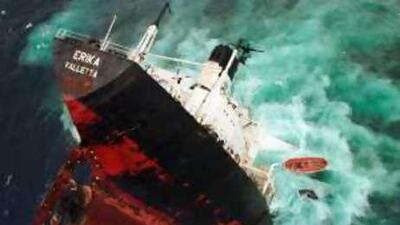Michael Regester's initiation into to the world of corporate crisis management was a baptism by fire. Just before 1am on Jan 8, 1979, a fireball visible from more than 100km away lit the winter sky off Bantry Bay, near Ireland's south-west tip. Thrust skyward by a massive explosion, as the rusting supertanker Betelgeuse broke her back and sank during an offloading accident at Gulf Oil's Whiddy Island oil terminal, discharging her flammable cargo into the sea, it signalled Ireland's worst maritime disaster.
As temperatures soared towards 1,000 degrees Celsius, the blast hurled ship's crew and workers on the jetty into the burning sea. In total, the incident claimed 51 lives, including the Bantry pilot, a salvage diver and the wife of a ship's officer who was visiting her husband on board. Mr Regester, who now heads an international public relations firm specialising in crisis-management advice, was then stationed at Whiddy Island as the terminal's relatively inexperienced corporate communications manager. Without any relevant training, he suddenly found himself in charge of communicating to stunned local residents, suspicious authorities, the press and families of accident victims how the explosion had occurred, and what his US-based employer planned to do about it.
"Back in those days, no company had anything in place for dealing with the communications aspects of a major disaster. I can honestly say I made every mistake it was conceivable to make," Mr Regester said during a recent visit to Abu Dhabi to open a new branch of his firm, Regester Larkin. "My biggest mistake was believing the lawyers," he added. "They lied to me, so I unintentionally lied to the press, and a few months later it all came out."
"Lie and you die," Mr Regester intoned, invoking what has become a personal and professional mantra. Built in the late 1960s, the Whiddy Island oil terminal was for a time the main transshipment facility for Middle-Eastern crude bound for European refineries located at older ports that could not accommodate supertankers. At first it operated successfully, transforming the economy of Ireland's West Cork region, around Bantry Bay. But by the late 1970s, Gulf was struggling to maintain the terminal's viability, as rising oil prices and economic recession cut into European oil demand. The local Gulf operating company was forced to undertake cost-saving measures, including, it turned out, skimping on the maintenance of emergency-response equipment.
An Irish government inquiry and a six-month High Court tribunal placed most of blame for the disaster on the Betelgeuse's owner, the French oil company Total. As revealed in an inspection report, the tanker was in decayed condition, with 37 cracks in its crude cargo tanks and badly corroded ballast tanks. The ship had no effective disposal method for dangerous vapours released during ballasting operations, such as those undertaken at Whiddy Island. Photographs showed stress lines on its hull.
But Gulf was also held partly responsible. The tribunal heard that the company's fire emergency plan, drawn up in 1970, had not been updated in nearly a decade. But most ominously to Mr Regester were discrepancies between local residents' and Gulf's accounts of the timing of the blast. That was important, because the sole survivor of the Whiddy Island explosion worked in the oil terminal's control room: "The big question was whether he was there to initiate alarms when the vessel started to break its back. Could lives have been saved? The lawyers said he had been there and had done everything humanly possible."
But when journalists asked to interview the control-room operator, they found he had been "whisked away". Eventually, the tribunal determined the operator had been sleeping when things started to go wrong. "I was deeply shocked," Mr Regester said. Soon afterwards, he parted ways with Gulf. The company was acquired a few years later by Chevron, a more successful US rival that ConocoPhillips subsequently gobbled up.
Traumatised by the Betelgeuse incident, a career in crisis management was the last thing on Mr Regester's mind in the early 1980s. But he had accepted a string of invitations to speak to oil companies about his experience, and the requests for advice kept pouring in, including from Total. But it was years before Total fully accepted his advice. In 1999, with oil prices struggling to move above $10 a barrel, oil producers were again cutting corners, and Total loaded an ill-fated cargo of crude into another rusting tanker, the Maltese-registered Erika. On Dec 12, it broke in two and sank off the coast of Brittany, spilling 20,000 tonnes of heavy fuel oil in the worst environmental disaster to hit the scenic French province. The oil slick reached the Breton beaches two weeks later, polluting 400km of coastline, killing more than 100,000 sea birds, severely damaging fishing and tourism businesses, and, according to a French government institute, exposing clean-up volunteers to cancer risks.

